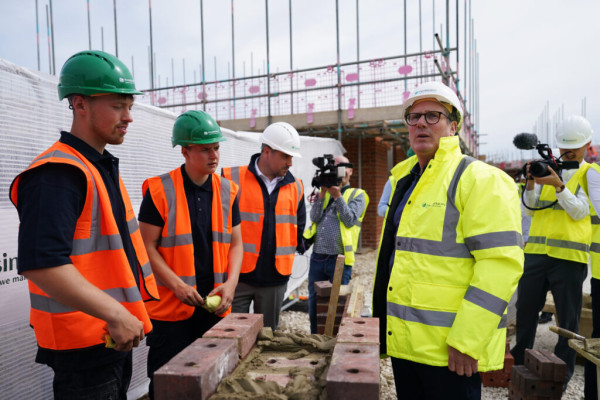Labour’s top policy priorities
LONDON — Keir Starmer has arrived in Downing Street with his new Cabinet.
So what are their first priorities?
Big-ticket items include decarbonizing the electricity grid by 2030, building 1.5 million homes over five years, hitting long-missed health service waiting time targets by 2029 and hiring 6,500 teachers, 5,000 tax investigators, 3,000 fully-trained police officers and 8,500 mental health staff.
More immediately, the Labour leader must now write his first King's Speech — the legislative plan for year one which will be delivered on July 17. Stated priorities for that first year include an employment rights bill, renters' reforms, planning reform to begin this summer, tax changes from this fall, increased devolution, a review of business taxes, an increase in NHS appointments, a publicly-owned energy firm, an Armed Forces Commissioner and a review of defense spending.
But the funds to pay for it all are due to come from a relatively thin wedge of tax rises worth around £8.5 billion, a sum experts say is nowhere near enough to fix a state groaning from years of austerity under the last Conservative government.
While former Prime Minister Rishi Sunak began the campaign with eye-catching new policies, Labour Leader Keir Starmer — desperate not to look profligate — largely harked back to and re-confirmed items his party had already agreed.
Our policy round-up below combines what the Labour Party wants to say (through its manifesto and press releases) with what it doesn’t (through answers in media interviews).
Economy and tax
First budget this fall. New Chancellor Rachel Reeves confirmed during the campaign that she would deliver a budget after 10 weeks' notice to the Office for Budget Responsibility, one of the U.K's main financial watchdogs. There will also need to be a wider spending review mapping out future years. Labour has committed to two fiscal rules: the current budget year-on-year must be balanced with no borrowing for day-to-day revenue, and debt as a percentage of GDP must be projected each year to be falling in five years’ time.
No rises in the main rates of VAT, National Insurance, Income Tax rates or Corporation Tax. The Labour manifesto says “we will ensure taxes on working people are kept as low as possible" and spokespeople committed to keeping the big four taxes where they are. But Labour has not pledged to bring the overall tax burden down, because it is keeping a six-year "stealth" freeze on income tax salary thresholds.
Other tax rises not ruled out. The party has not ruled out rises for Capital Gains Tax, Stamp Duty and other property taxes, and fuel duty. Labour has pledged to raise stamp duty for foreign buyers from 2 to 3 percent, raising a purported £40 million, and a temporary stamp duty discount for first-time buyers will not be extended.
“Highest sustained growth in the G7.” Labour has targeted this for the end of a five-year term.
"New Deal for Working People." A major demand of the unions, this includes ending so-called "fire and rehire" practices, banning some (but not all) zero-hours contracts and new requirements for the minimum wage, including forcing firms to offer the same minimum rate to all over-18s. The party says it would "introduce" legislation within 100 days, but in reality a raft of consultations would follow before it became law.
Energy, climate and industry
Decarbonize electricity by 2030. Labour would borrow an average of £3.5 billion a year to fund its Green Prosperity Plan, which aims to achieve “zero-carbon electricity by 2030.” The party pledges an "energy independence bill" to establish the framework for this, and would seek billions more in private investment to match public funds. However, investment was cut from £28 billion a year in a major U-turn last year.
GB Energy. Labour has said it will set up a publicly-owned energy firm within its first year, and aides have said grants would start being paid within “months” to councils in a “local power plan.”

Energy efficient homes. Labour pledges to “ensure homes in the private rented sector meet minimum energy efficiency standards by 2030,” which aides say equates to EPC standard C. Its original Warm Homes Plan was scaled back, with the party initially promising to upgrade “every home that needs it” to EPC standard C within a decade, to upgrade five million homes within five years.
Ban on new petrol and diesel cars by 2030. Labour has pledged to restore this phase-out date, which had been delayed by the Conservative government.
Banning pesticides and insecticides. The new government will ban neonicotinoid pesticides imidacloprid, clothianidin and thiamethoxam due to their impact on bees.
Extend the Energy Profits Levy. The Conservative government’s levy, which focuses on profits made by oil and gas companies, will be extended from March 2029 to the end of the parliament, and the tax is raised by 3 percentage points.
Housing and infrastructure
1.5 million new homes. Labour pledges to build “1.5 million new homes over the next parliament,” and has also said it will release more green belt land for development. When a home is owned, Labour says it would make the government’s existing mortgage guarantee scheme (which expires in 2025) permanent.
Planning reforms within months. Last November, Labour promised a plan within "months" of taking office which will set out new policy to reduce red tape for "significant infrastructure." It would be partly done through amendments to the National Planning Policy Framework and a written ministerial statement which would be quicker to enact than legislation.
Public ownership of the railways. Britain's regional railway networks will be moved from private to public ownership when contracts with existing operators expire. But privately owned “rolling stock leasing companies” (ROSCOs) would retain most of the carriages and locomotives, and lease them back to Great British Railways — the proposed new body running the system — to use. The manifesto also pledges a “ten-year infrastructure strategy” which would include improving rail connectivity in northern England.
End no fault evictions, end leaseholds. Party would “immediately” abolish Section 21 "no fault" evictions, as had been planned by the Tory government. The manifesto also pledges to “finally bring the feudal leasehold system to an end,” but Cabinet minister Lisa Nandy’s pledge in May 2023 to “introduce legislation in the first 100 days” is no longer mentioned.
National Wealth Fund. Party re-commits to fund costing £7.3 billion over the course of a parliament to upgrade ports and supply chains (£1.8 billion) … build new gigafactories (£1.5 billion) … the steel industry (£2.5 billion) … accelerating carbon capture (£1 billion) and supporting green hydrogen manufacture (£500 million).
Foreign affairs and defense
Spending review. Manifesto re-confirms pledges to conduct a “strategic defense review” in Labour’s first year — but it does not say when defense spending would rise to 2.5 percent of GDP.
U.K-EU relationship. The party has committed to seeking a new security agreement and veterinary agreement with the EU, which Brussels officials believe would require oversight of the European Court of Justice — a major sticking point in the past. Starmer has however ruled out a return to freedom of movement, in a reversal of his position in 2020.
Staying in the ECHR. Starmer has ruled out leaving the European Convention on Human Rights.
On current conflicts. Labour would back a special tribunal for the crime of aggression against Russia, and “work with allies” to seize and use frozen Russian state assets to support Ukraine … the party backs an “immediate ceasefire in Gaza , the release of all hostages, the upholding of international law, and a rapid increase of aid” … and would recognize a Palestinian state “as a contribution to a renewed peace process,” meaning U.K. recognition could come before a full and final peace settlement with Israel. However, it would not come immediately.

On China: Labour's stance straddles the fence between hawks and doves, saying the nations should “co-operate where we can” but “compete where we need to and challenge where we must.” Incoming Foreign Secretary David Lammy has not ruled out a visit to Beijing and says it is “in everyone’s interest that China’s relationship with the West endure and evolve."
New veterans' roles in government. Labour would have a veterans minister in Cabinet, and an armed forces commissioner would be legislated for in the first King’s Speech.
Immigration and borders
Net migration cut (but no firm target). “I will bring immigration numbers down” from 685,000 in 2023, Keir Starmer vowed, but refused to commit to a number, or to cutting net migration numbers every single year. “They need to come down, we’ve got a plan to bring them down, but you can’t wish them down," he said.
"Border Security Command." A new body "will be created in first 100 days," said Home Secretary Yvette Cooper, led by a former police, military or intelligence chief working across intelligence and enforcement agencies and reporting to Cooper directly to reduce small boat crossings in the Channel.
Migrant returns and enforcement unit. Manifesto re-commits to negotiate more migrant returns agreements with third countries, and “a new returns and enforcement unit, with an extra 1,000 staff, to fast-track removals” of migrants with no right to be in the U.K.
Shortage jobs identified. A new body called Skills England would work with the existing Migration Advisory Committee to identify shortage professions and trigger more training for British workers.
Rwanda plan scrapped: Starmer has said he will scrap the Tory government's plans to deport would-be asylum seekers to Rwanda, and return to having the U.K. consider each case. However, he would consider sending migrants to a third country while that U.K. processing takes place, "if that was possible to do it in compliance with international law."
Health and social care
Smoking ban forever for current children. Labour, like the outgoing Conservatives, says it is committed to a New Zealand-style ban on people who are currently under 18 ever being able to buy tobacco products.
More NHS appointments. The party has pledged to raise the number of NHS appointments by 2 million a year (40,000 per week) by the end of its first year.
Cut waiting times. Labour pledged to meet a long-missed NHS treatment target, for 92 percent of patients to be seen within 18 weeks, by the middle of 2029.
NHS to buy care home beds to free up hospital capacity. Now-Health Secretary Wes Streeting said “Labour will get more hospitals doing what Leeds teaching hospitals are already doing, investing in local social care beds to discharge patients faster — better for patients and less expensive for taxpayers.”
Double hospital scanners. Manifesto repeats pledge to double number of CT and MRI scanners, which it says would cost £250 million a year by 2028/29.
Pensions, benefits and poverty
Free breakfast clubs in primary schools. Labour has promised “an ambitious strategy to reduce child poverty,” but not outlined in full what this will entail. It says first steps include tackling zero-hour contracts, energy bills, and setting up free breakfast clubs in every primary school, which are costed at £375 million per year.
Boris Johnson’s social care cap to continue. Delayed social care reforms already announced by government, including a £86,000 cap on lifetime contributions, “will continue,” said a Labour spokesperson.
Reform benefits. The party says it is “committed to reviewing Universal Credit,” but with little details of the review. It has also pledged to “reform or replace” the Work Capability Assessment, and reform employment support, but also with no detail. And Starmer has refused calls to scrap the two-child limit on benefits, introduced by the Tory government.
Pensions support. Labour committed to a pensions triple lock — which raises the state pension by the highest of 2.5 percent, inflation or average wages each year — for the whole five-year term. The manifesto also re-commits to reviewing pensions landscape to “consider what further steps are needed” to invest more in U.K. markets, but the party u-turned on its plan to bring back the lifetime allowance on pension contributions.
Education and childcare
Private school VAT hike. Chancellor Rachel Reeves confirmed VAT will be applied to private school fees, and business rates to the schools themselves, in Labour’s first budget.
6,500 more teachers. Party first pledged in 2021 to recruit 6,500 more teachers, which aides say would be achieved over a five-year parliament.
Free childcare rollout. After some to and fro, the party confirmed it would continue with the rollout of 30 hours' a week free childcare to children aged nine months and up from September 2025. However, a review of the policy was underway that could reform the system.
More nursery places. Labour says it would "convert 3,334 classrooms” to nursery settings, adding 100,000 childcare places, in schools where there is spare capacity due to falling birth rates. Nurseries would then be run either by private providers or by councils themselves.

Ofsted one-phrase gradings ditched. Manifesto re-commits to replace school inspection results with “report cards” that have more breadth, as demanded by unions.
Reform apprenticeship levy. Labour re-states its plan to rename it the “growth and skills levy,” with firms given more freedom to use up to half of government funding to cover apprenticeships or provide training for existing staff.
Police and crime
100-day security review. Labour says it would carry out a 100-day "security sprint" review of threats to the U.K. with MI5, police and Whitehall looking at Russia, Iran, extremism and AI.
Police reforms. Manifesto re-commits to mandatory standards on police vetting, checks and misconduct, barring anyone with a history of violence against women and girls. The party has also committed to introducing a rape unit in every police force.
13,000 police officers. Labour re-stated its previous pledge to "put 13,000 neighborhood police and community support offices (PCSOs) back on the beat" by the end of a five-year parliament — of which 7,000 would be newly-recruited PCs or PCSOs. Of the rest, 3,000 would be volunteer special constables and 3,000 officers would have been recruited under government "uplift" plans.
New law on shop violence. The party has said it will introduce “a new law to make a specific offense of assaults and abuse against shop workers and to make sure it’s taken seriously by the police.”
Whitehall
Covid corruption commissioner. Party re-commits to the appointment to recoup funds from “pandemic-related fraud and contracts which have not delivered.”
Halving consultants. Party re-commits to halving consultancy spend in government and claims it would save £745 million a year.
HMRC boost. Party re-commits to give HMRC more investigation powers and invest £855 million a year in new technology and resources, including 5,000 more staff.
Gender and social issues
Gender recognition reforms. Labour would “simplify and reform” the gender recognition process by removing the need for people to prove they have lived for two years in their assumed gender, but keep a two-year cooling-off period before applications are approved. Spouses would no longer need to give their approval, and diagnosis would be signed off by one specialist registrar, no longer a judge-led panel. But the party U-turned last year on plans to let trans people “self-ID.”
Conversion therapy ban. Labour promises a “full trans-inclusive ban on conversion practices.”
Hate crime laws strengthened. “All existing strands of hate crime” would be made an aggravated offense.
Race Equality Act. Manifesto recommits to this law to “enshrine full rights” to equal pay, “strengthen protections against dual discrimination” and “root out other racial inequalities.”
Gender kept in Equality Act. The legislation will not be changed to emphasize biological sex, with alternative “clearer guidance” promised.
Sport
Football governance bill. Keir Starmer promised to pass the Football Governance Bill, which fell when parliament was dissolved, but said the idea of 10 percent levies on Premier League transfers would not be made law.
Democracy and ethics
Votes for under-18s. Manifesto re-commits to giving 16- and 17-year-olds the vote in “all elections," a major extension of the franchise which Labour has pledged for years.
No commitment to scrap voter ID checks. Starmer said the party has not "got great plans" to remove checks recently introduced by the Conservative government, which Labour opposed at the time. Labour is committed to extending the list of valid IDs, including to Veteran Cards.

MPs’ second jobs. Labour would ban “paid advisory or consultancy roles” for MPs as an “immediate step,” and a "Modernisation Committee" would then draw up restrictions to prevent jobs that “stop them serving their constituents and the country.” This is more vague than Labour's earlier National Policy Forum, which pledged to “ban second jobs for MPs, with only very limited exemptions.”
Hereditary and oldest peers banned. “Immediate” legislation would remove hereditary peers from the U.K.'s House of Lords, toughen up participation rules and make it mandatory for all peers to retire at the end of a parliament in which they turn 80. But a previous pledge to replace the Lords entirely with an elected chamber is kicked into the long grass — and the party is expected to introduce dozens of peers within weeks of being elected.
Devolution
Take back control bill in first King's Speech. Manifesto re-commits to “deepen” existing devolution deals with more powers and “widen” them to more areas, including through a "take back control bill." Authorities would be legally required to develop long-term Local Growth Plans that “align with our national industrial strategy.” The party will introduce a new Council of Nations and Regions and give councils more powers to franchise local bus services, lifting the ban on owning their bus networks.
Housing and planning powers "consolidated." “We will seek to consolidate powers to allow for improved decision-making.” Aides say this applies specifically to mayors.
Funding. Another £320 million spread across five years to fix potholes, on top of £8.3 billion already committed by the government over 11 years. Would also introduce “multi-year funding settlements” to councils, and “new targets” to accelerate the rollout of electric vehicle charge points (but hasn’t said what those targets will be).